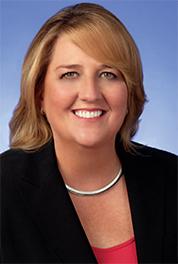Mary Ellen Callahan, ’97: Government Privacy Practitioner Returns to Private Practice

Last year, after three and a half years as Chief Privacy Officer of the United States Department of Homeland Security, Mary Ellen Callahan, ’97, founded the Privacy and Information Governance Practice at Jenner & Block.
She began developing her expertise in privacy law and policy early in her legal career. When she joined Hogan & Hartson (now Hogan Lovells) after graduation, the internet was just becoming a substantial conduit for commercial transactions (it was first used for such transactions in 1995). Recognizing that a new field of legal practice was opening up, related to online privacy and information management, she focused her activities in that area, taking on assignments that included leading audits of clients’ privacy and security policies and helping industry organizations define self-regulatory practices for the collection and dissemination of online information. She served as counsel to and cochair of the Online Privacy Alliance, a cross-industry coalition of more than 80 global companies and associations committed to promoting the privacy of individuals online.
Not long after the 2008 victory of President Obama—whose seminar she had taken at the Law School and whose campaign she had advised on privacy and technology issues—Callahan was selected to head the first statutorily mandated privacy office in the federal government, at the Department of Homeland Security. Completing more than 200 privacy impact assessments of DHS programs, she also had a voice in major decisions that included the monitoring of social media, the use of full-body scanners in airports, the sharing of airline passenger records between the United States and the European Union, and the establishment of privacy policies at the 71 “fusion centers” where intelligence information is shared among a multitude of federal, state, and local agencies.
In her additional role as DHS’s Chief Freedom of Information Act Officer, she oversaw the handling of as many as 250,000 Freedom of Information Act requests each year. During her tenure, she doubled the size of her office’s staff and replaced many costly contractors with career experts.
She says that her most significant accomplishment was not related to any single event or issue but to altering the perception of privacy issues within DHS as a whole: “When I first arrived, there were no reliable systems for insuring that privacy was considered in decision making. Too often, we learned about issues only through our personal contacts within the agency—and, also too often, that happened late in the process, so we would have to scramble to have our input heard. It took a lot of insisting on my part to change that. Luckily, I’m not shy about insisting, and therefore I systematically worked on integrating privacy into the decision-making infrastructure at DHS.” Further demonstrating her determination that privacy would be taken seriously, she led three high-profile internal investigations into apparent noncompliance with the department’s privacy policies.
“The goal,” she says, “is to have privacy by design, where privacy-related matters are robustly integrated into the life cycle of an organization. My time at the Law School helped me immensely with that, as it has with many other aspects of my career. Learning how to analyze and address the broader policy issues in a situation, beyond the narrower legal questions, has been a very valuable skill.”
“It was also very gratifying during my time in Washington,” she adds, “to see former professors of mine in positions of such great influence. Not just the President, but Elena Kagan and Cass Sunstein, too.”
Callahan brings a lot of experience to her practice at Jenner & Block, and also a broader perspective. “As outside counsel, it’s sometimes easy to underappreciate what a client is being asked to undertake,” she says. “I have a deeper personal understanding now of how much organizational effort is required to make real change and make that change stick. I think that will pay off in my practice and, most importantly, for our clients.”